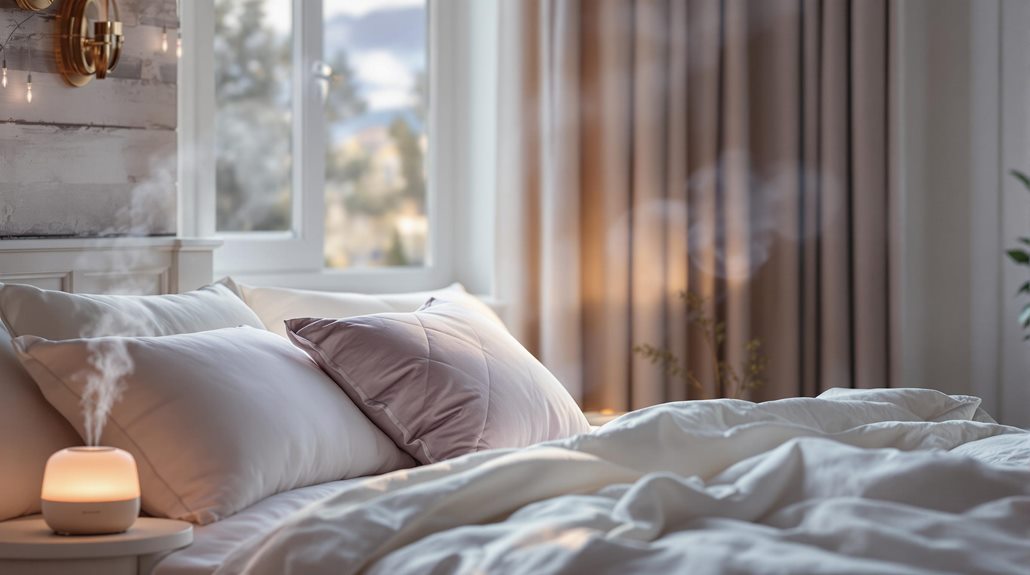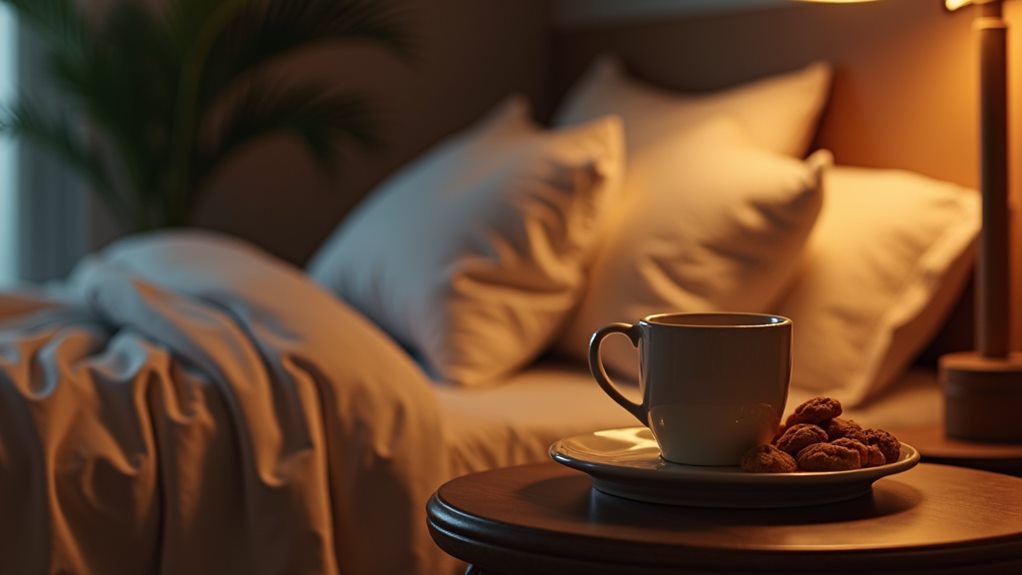
You’re not doomed to be a sleep-deprived zombie—not if you nail these five strategies. First, commit to a consistent sleep schedule; your body’s not a fan of chaos. Next, craft a serene sleep zone—think cool, dark, and quiet; your bedroom shouldn’t resemble a disco. Watch what you eat and drink. Snack on almonds, not caffeine, after 2 p.m. Get moving with some daily exercise, but don’t go beast mode right before bed. Finally, bid stress goodbye by embracing relaxation techniques. You’ve got this, and trust me, there’s more to discover to boost your snooze and mental mojo!
Master Your Sleep Routine
To consistently enjoy restful sleep, it’s crucial to master your sleep routine with some simple yet effective strategies.
First up, your consistent sleep schedule. Commit to going to bed and waking up at the same time every day. Yes, even on weekends—sorry, but your body doesn’t take a day off. This magical consistency reinforces your natural sleep-wake cycle, making nighttime sleep more predictable and restful.
Creating a sleep-conducive environment is important too; aim for a cool, dark, and quiet bedroom to help you relax into better sleep.
Next, let’s tackle caffeine intake. Limit it to before 2 p.m. Trust me, you’ll thank yourself later. Late caffeine binges are sneaky sleep thieves, robbing you of precious minutes and messing with your REM cycles.
For ideal sleep quality, embrace mindfulness practices as relaxation techniques to gently ease yourself into dreamland with a calming pre-sleep routine. Think: reading or light meditation.
Creating a sanctuary-like bedroom environment is also key. Aim for a cool, dark, and quiet space—things your future well-rested self will appreciate.
Finally, watch those late-night snacks. Heavy meals disrupt sleep, so keep it light.
Mastering this routine not only enhances sleep quality but boosts your mental well-being, too. And hey, who doesn’t love being bright-eyed and bushy-tailed?
Design a Calming Sleep Zone
Almost always, the foundation of restful sleep begins with designing a calming sleep zone. You want a sanctuary for your sleep and mind health.
Start by nailing the comfortable temperature, somewhere between 65 to 68 degrees Fahrenheit. This isn’t a sauna, nor is it an icebox—a sweet spot that’ll have you sleeping like a baby.
With the increasing prevalence of bright lights causing melatonin disruption, blocking out light is essential. Use blackout curtains so light doesn’t rudely interrupt your dreams.
Next, tackle the issue of disruptive noise—a true villain in our sleep saga. White noise machines or earplugs make fantastic noise warriors.
Design for relaxation. Opt for calming colors and minimal clutter in your space to craft a serene environment that’ll whisper “zzz” into your ear.
Oh, and about that ancient mattress that feels like sleeping on a cobblestone street—time for an upgrade. A supportive mattress and the right pillow are spine-savers.
Here’s a quick checklist:
- Set a comfortable temperature.
- Block out light with blackout curtains.
- Combat noise with soundproofing.
- Create a serene environment for relaxation.
Your mind (and back) will thank you!
Monitor Food and Drink Choices

A crucial part of achieving restful sleep is being mindful of your food and drink choices. Without paying attention, you might sabotage your sleep quality without even knowing it. Drinking water before meals might help reduce calorie intake due to the activation of fullness hormones, thereby impacting restful sleep indirectly by preventing overeating before bed.
A balanced approach, however, is key since water alone can’t guarantee weight loss. Let’s face it; nobody wants to toss and turn all night from poor digestion or to take a caffeine-fueled joy ride till sunrise.
So, what’s the plan? First, sync dinner two to three hours before bed. Your stomach and sleep will thank you! Anything heavy or rich can disrupt your rest, so let your body digest in peace.
Caffeine and alcohol are like those frenemies you don’t fully trust. Limit caffeine after 2 p.m. to avoid sleep duration drops and protect your REM sleep. With alcohol, sure, it might nudge you to sleep, but later, it’ll wake you up and argue with your melatonin. Not ideal bedtime buddies, right?
Swap them out for a balanced diet filled with sleep-promoting foods like almonds and turkey.
Think you’ve got hydration covered? Great! Just ease up on fluids before bed to prevent those annoying nighttime awakenings.
Focus on staying hydrated during the day. And voilà, your path to better overall sleep is ready!
Integrate Regular Exercise
How can you improve your sleep quality without rewiring your entire day? Integrating regular exercise is your secret weapon.
It’s not just about six-pack abs or breaking a sweat. Regular physical activity is your ticket to better sleep and health. Plus, it doesn’t have to be an intimidating task. Just 20 minutes daily and voilà, you’re on your way to conquering insomnia and relish quality sleep.
- Morning Moves: Exercise in the morning or early afternoon. It not only kickstarts your day but also syncs with your circadian rhythm, helping you sleep better at night.
- Outdoor Fun: Get outside! Daytime light during outdoor activities not only enhances health but also regulates your internal clock. Nature wants to help you sleep, so head out there.
- Consistency is Key: Make a habit of regular exercise. Trust me, your sleep cycle and overall well-being will thank you.
- Avoid Nighttime Ninja Mode: Save the intense workouts for earlier; otherwise, you’ll be bouncing off the walls when you should be catching Zs.
Keeping it simple—you don’t need to move mountains, just move yourself! Your quality sleep awaits.
Alleviate Stress Before Bed

While the day’s demands can leave you feeling frazzled, there’re effective ways to alleviate stress before bed, setting the stage for quality sleep. Let’s explore some sanity-saving tricks to get you there. First up, try mindfulness meditation. It helps lower those irritating stress levels and boost your sleep quality. Trust me, when your mind’s as calm as a golden retriever on a Sunday morning, you’ll snooze like a baby.
Jot down your worries in a stress journal. Dumping those anxious thoughts on paper really clears your head. Also, a calming pre-sleep routine like gentle stretching or browsing a book is a subtle signal to your body: “Hey, it’s sleepy time!” And, spoilers alert—consistent routines secretly lower your cortisol for improved emotional well-being.
Now, relaxation techniques are like a superhero toolkit for your brain. Progressive muscle relaxation or visualization can totally zap physiological arousal. It works like magic for better sleep!
Here’s a quick cheat sheet to help:
| Practice | Benefit | Tip |
|---|---|---|
| Mindfulness Meditation | Lowers stress levels | Try 5 minutes before bedtime |
| Stress Journal | Clears the mind | Write nightly before sleep |
| Progressive Muscle Relaxation | Reduces physiological arousal | Focus on one muscle group at a time |
With these tricks in your arsenal, you’ll conquer that freeway to dreamland in no time. Sweet dreams!
In Summary
So, why toss and turn when you can blissfully snooze? With these strategies, you’ll snooze like a pro! Tweak your bedtime routine, create a cozy sleep cave, and watch what you munch—and subtract the midnight snacks. Toss in some exercise; it’s not just for Instagram. Stress? Kick it to the curb before you even hit the sheets. Ready to say goodbye to counting sheep? Give this a whirl and thank me later. Sweet dreams!














